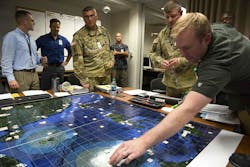BAE Systems to develop computer-aided battle planning to find opportunities and weaknesses at machine speed
ARLINGTON, Va. – Computer scientists at BAE Systems are moving to the second phase of a classified U.S. military research program to develop enabling technologies for computer-aided battle planning with performance as good as humans, but that work at the speed of computers.
Officials of the U.S. Defense Advanced Research Projects Agency (DARPA) in Arlington, Va., announced a $12 million contract earlier this month to the BAE Systems Electronic Systems segment in Merrimack, N.H., for the second phase of the Strategic Chaos Engine for Planning, Tactics, Experimentation and Resiliency (SCEPTER) program.
The SCEPTER machine-generated campaign-scale planning and analytics project seeks to develop analytic computers that will produce machine-generated strategies that can compete with humans in the planning of real warfare as evaluated within trusted simulation environments.
Related: Top technology challenges this decade for the warfighter
The program seeks to develop machine-generated strategies and courses of action for strategic planning by exploring complex military engagements at fast computer speeds. SCEPTER involves developing and simulating tailorable abstraction of trusted expert informed models to identify vulnerabilities in human-generated plans.
In the second phase, BAE systems experts will apply SCEPTER enabling technologies to develop and continually evaluate war plans as changes in theater occur. The aim is to find new opportunities and weaknesses, and help prevent surprise from the enemy. Ultimately, technology developed under this program will move to the U.S. military services.
SCEPTER will discover new courses of action by exploring complex military engagements at machine speed. Enabling high speed will come from tailorable abstraction of trusted expert-informed models. Researchers will validate a few of the best performing solutions in high-fidelity trusted simulators and with thorough human review.
Related: Electronic warfare: all systems go
BAE Systems won an $8.3 million contract for the SCEPTER' program's first phase in September 2022 to address two key technical focus areas: developing unscripted goal-oriented agents able to discover relevant and interpretable solutions; and managing growth of threats to achieve fast exploration of large-scale military scenarios.
SCEPTER is a two-phase three-year battle planning program. Charles River Analytics Inc. in Cambridge, Mass., also was involved in the SCEPTER's first phase.
DARPA researchers say they plan to spend $39 million on the SCEPTER program over the next three years. For more information contact BAE Systems Electronic Systems online at www.baesystems.com/en-us/our-company/inc-businesses/electronic-systems, Charles River Analytics at https://cra.com, or DARPA at www.darpa.mil.
About the Author
John Keller
Editor-in-Chief
John Keller is the Editor-in-Chief, Military & Aerospace Electronics Magazine--provides extensive coverage and analysis of enabling electronics and optoelectronic technologies in military, space and commercial aviation applications. John has been a member of the Military & Aerospace Electronics staff since 1989 and chief editor since 1995.
